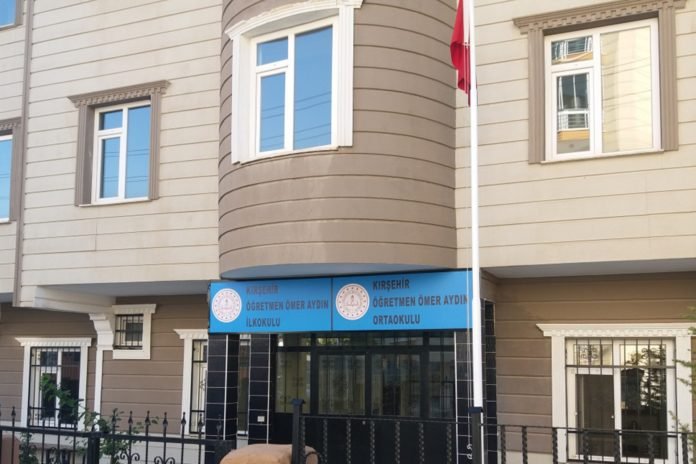The children of Syrian, Iraqi and Afghan refugees were grouped into a single school in the Central Anatolian city of Kırşehir after Turkish parents refused to send their children to the same schools as refugees, claiming a “bad influence,” the Evrensel daily reported.
According to some of the teachers who are against this discriminatory approach, this unofficial policy has been implemented for six years. Following protests by the Turkish families, the refugee children were initially placed in a small school building in a remote part of the city. After the small, old building was demolished by the municipality, the authorities decided to group the refugee children in a new school to which no Turkish students were admitted. Refugee children in different school districts were denied enrollment in their local schools and were directed to this school, the Ömer Aydın Elementary School. In time the school reached its capacity of 1,000 students.
Speaking to Evrensel on condition of anonymity, some teachers said they opposed the move, arguing that it was discriminatory and would prevent refugee children from adapting to life in Turkey. Yet the authorities, including the provincial directorate of education, inspectors from the Ministry of Education and school administrators, failed to take any steps.
While there are some refugee students in other schools, it is only because these families are wealthier, the teachers said. The school took several measures to cope with the overcrowding, yet even an increase in the number of classes and the introduction of split sessions did not improve the conditions. Things have gotten worse with the pandemic.
According to the United Nations High Commissioner for Refugees (UNHCR), as of October 7, there are 3,627,481 Syrian refugees living in Turkey. Over 600,000 of them are at the age of K-12 education.
Denying the allegations of systemic discrimination, Ömer Aydın Elementary School Principal Recep Sulubulut said the school is open to all students and argued that the profile of the students is different only because the school is located in an impoverished neighborhood. Sulubulut did not answer the question of whether there are Turkish students at the school and said he needed to check the records. He claimed the refugee students do not have adaptation problems as the refugees born in Turkey started school this year.
Head of the Kırşehir branch of the Education and Science Workers’ Union (EĞİTİM SEN) Özdemir Beyhan said the problem has been continuing for a long time and that isolation is not good pedagogically. According to Beyhan, there are refugee students in other schools, but Ömer Aydın Elementary School has only refugee students.
Beyhan said the refugee children had been experiencing problems because they left their country, they aren’t fluent in Turkish and some suffer the trauma of war. “The trauma has caused refugee children to develop violent games such as throwing rocks. But this is only a game for the children,” Beyhan said. “Some parents took their children out of school or did not want the children of refugees in the same school as their children. In time, unfortunately, the refugee children were put into in a single school.”
Syrian refugees in Turkey have been increasingly targeted by hate speech and hate crimes and are blamed for many of Turkey’s social and economic troubles. According to Soner Çağaptay, director of the Turkish Research Program at The Washington Institute for Near East Policy, emerging opinion leaders with large online followings have been especially important in normalizing anti-Syrian attitudes.
Çağaptay mentions Sinan Oğan, a former deputy and a dismissed member of the Nationalist Movement Party (MHP) who boasts over a million Twitter followers, as an example. In a tweet Oğan claimed that Syrian and Afghan refugees rape women and boys and that “chopping” off heads was a part of Syrian culture. The tweet received more than 10,000 likes and retweets.
According to the “Hate Speech and Discriminatory Discourse in Media 2019 Report,” published by the Hrant Dink Foundation Syrian refugees in Turkey were the second most targeted group in the Turkish media, with 760 hate speech items. According to the report they were systematically coded as criminals, murderers and thieves who posed imminent security problems including terrorism. Syrians were also represented in the media as the reason for the current adverse economic situation in Turkey and rising unemployment numbers.
The hate speech has led to serious incidents in the recent past. Syrian refugee Abdulkadir Davud, 21, was shot dead on August 18 in what appears to be a hate crime in the Zeytinburnu district of İstanbul. On September 13, 16-year-old Syrian Eymen Hammami was stabbed to death in another alleged hate crime in the northern city of Samsun.


















[…] Copiii refugiaților sirieni, irakieni și afgani au fost grupați într-o singură școală după ce părinții turci au refuzat să-și trimită copiii la școală pentru că aceștia ar exercita o „influență proastă”, relatează Duvar English. […]